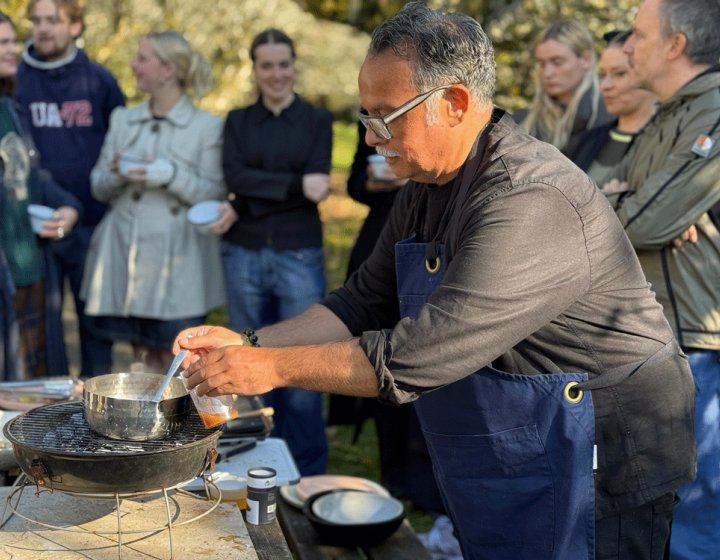How to write a sitcom

This article is written by Simon Nicholls, a multi-award-winning comedy producer and Course Leader of Comedy Writing MA (Online) at Falmouth University.
Many people dream of writing a sitcom but how do you nail the intricacies of creating comic characters, plotting and strong dialogue? Here’s some Dos and Don’ts as a helpful comedy ‘amuse-bouche’ before you get started on writing your sitcom.
How to write a sitcom
1. Research before you start writing
DO thoroughly research your sitcom's world and characters before you start writing. If you're passionate about space stations and want to write a comedy set on one, don't just make it all up. Thoroughly research documentaries about space stations and interviews with people who have lived on them. Get a sense of 'space speak' which can filter into your characters' dialogue.
Commissioners regularly say they want authentic stories from authentic voices. Even if you're writing a comedy that's autobiographical and set in a place you know well, do your research. Scripts that are ill-informed stick out like a sore thumb.
A big part of writing comedy is finding the truth in your subject. The writers of Red Dwarf had no prior experience of being left alone on a massive spaceship in the future, but they did properly consider the truth and reality of a group of small-minded people stuck together in a confined space. Thoroughly immersing yourself in clips, documentaries, interviews and literature linked to your comedy's chosen world will help make your sitcom idea real and authentic. And if that's not enough, thoroughly researching your show's world will give you ideas for characters and potential storylines. Win win!
DON'T just decide that you want to write a sitcom set in a fishmongers, when you have no genuine interest in or prior knowledge of fishmongers. Producers and commissioners can smell a mile off when a comedy (especially one set in a fishmongers – cue trumpet noise) has been developed by a writer with no real passion or experience of the setting and its people. Developing a comedy takes time, so let your sitcom idea be about something you're truly excited by.
2. Structure and plan your sitcom
DO thoroughly plan your sitcom’s premise, its characters and your script’s plot in advance. It means your half hour script won't take you 18 months to write.
DON'T start writing without a thorough story plan. The logic is you wouldn't build a house without a plan: who wants to open a front door and walk into a fridge?
Write a comedy script without a plan and you'll end up with the script equivalent of the leaning tower of Pisa. And no one wants to see that filmed as an audience sitcom (although the leaning tower of Pisa pulls in 5 million viewers a year; something that most broadcasters can only dream of. Ahem.)
3. Focus on characterisation
DO make sure that your sitcom's plot matters to your main character. If what your main character is trying to achieve really matters to them, then it will feel important to us. On paper, we shouldn't care that one week Frasier and Niles want to run a restaurant. But because the writers establish that it really matters to them, we want to stick around and see if they succeed.
DON'T come up with a plot that doesn't matter to your main character. If the story doesn't matter to the main character, why should we care? Come up with a story that doesn't matter and your plot will have no drive or emotional connection for the viewer.
4. If you get stuck then take a break
DO step away from your desk if you hit a brick wall with your sitcom script. Staring at your computer screen, becoming increasingly frustrated with a weak plot point or a character that's not funny enough, won't solve the problem. I have no scientific backing for this, but the act of leaving your desk and doing something else like going for a walk often unlocks your brain and helps you solve the problem.
I have first-hand experience of this working. I used to produce a BBC comedy series fronted by Dave Gorman called Genius and whenever we hit a script problem, Dave would go to the loo and come back with the solution. Now it's possible that Dave had acclaimed screenwriter Sir Tom Stoppard locked in his toilet. Or - and perhaps more likely - it could be that the process of taking 'a time-out' and doing something completely different is perfect for resetting your brain and coming up with script solutions.
DON'T consider never going to the loo as an option in life. You'll burst and create quite a mess.
5. Add a plot twist
DO come up with surprising twists for your sitcom story. Remember when you've watched a show or film and figured out what will happen next? After the initial sense of believing you're really clever, do you remember how unsatisfying and annoying that is? Unfortunately for you as a comedy writer, people are clever and have watched almost everything. So coming up with surprising twists isn't easy. But like vegetables, sunlight and income tax, plot twists that keep the audience hooked are a necessity.
DON'T give up creating a surprising twist for your comedy script. Push your brain to think of 10 different ways a moment could play out. By forcing yourself to come up with so many, your brain will go to places it didn't know existed and - bing! - you'll surprise yourself with what you've come up with. All you need is one of the ten ideas to be a surprise and a winner. It doesn't matter if the other nine are lame: it's all part of the process. Surprise yourself and you'll likely surprise the audience. And if that doesn't work, go for a walk or to the loo (you may find Sir Tom Stoppard is there).
6. Connect with your audience
DO figure out what your sitcom is ACTUALLY about. Then make sure it’s visible in your stories.
The best sitcoms have a clear point of view and human story at their heart. The late great comedian and writer Garry Shandling said that his own series The Larry Sanders Show was a series about love and how the need for fame and fortune screws that up. On face value it was a satire about the making of a TV chat show, but there was a clear human angle at the show's heart.
So always ask yourself, 'what's the emotional story here?'. Allow yourself time to consider and figure out what your show is really about.
DON'T be a chump! DO take a look at Falmouth University’s online master's degree in Comedy Writing to develop your comic voice, hone your comedy writing skills and gain the street smarts of navigating the comedy industry. FYI, this kind of line is known in the comedy industry as a 'shameless plug'.
And finally...
Remember a sitcom is meant to be funny. For some reason, lots of writers forget this crucial ingredient. That doesn’t mean your show should be full of cracker jokes. Your aim is to create a world filled with interesting, nuanced and flawed characters; all of whom have a very clear point of view on the world. And you need to be showing that in your script from the first page. The best sitcoms show these characters reacting off each other in funny truthful ways.
Ready to invest in your comedy writing career?

About Simon Nicholls
Simon NicholIs has over 20 years of experience of working as a TV and audio comedy producer for the BBC’s comedy department. Recent credits include French and Saunders’ award-winning comedy podcast Titting About for Audible, BBC sketch show Wosson Cornwall and the award-winning Sue Perkins comedy, Nature Table, also for BBC Radio 4. Find out more about Simon’s career by visiting his staff profile.
Staff profile



